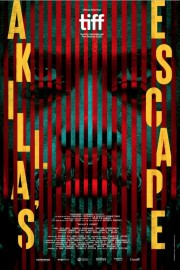Akilla’s Escape
**Seen at the 2021 Atlanta Film Festival.
Can a great protagonist exist within a good movie? Where the character writing is terrific, but the story is just decent? I think you can make an argument for yes, and Charles Officer’s “Akilla’s Escape” is an excellent example of this. The crux of the story hinges on a robbery that Akilla, the main character (and played by Saul Williams), stumbles upon, and tries to navigate the aftermath of, but it’s the way Officer and his lead actor build the character of Akilla that engaged me more fully. I may be revisiting this on the virtual side before the festival ends.
Saul Williams is a name many cinephiles probably haven’t heard in a while. A New York slam poet, he first made an impression on screen in 1998’s “Slam,” but while he’s done work ever since, not much of it (except maybe “K-Pax”) has been readily available to people. “Akilla’s Escape” is the first time I’ve seen him since “K-Pax,” and he is keyed in to what Officer wants to do with the character of Akilla (Williams also co-composes the terrific soundtrack with Massive Attack’s 3D). It’s one of my favorite performances of 2021 thus far.
Akilla is a foot soldier in marijuana distribution in Toronto; in fact, he’s been involved since he was a teen. Now that it is legal, however, he’s planning his exit. His grower (Colm Feore) doesn’t understand it, but by the time the film’s 90 minutes finish up, we will. One night, he’s going to one of the dispensaries that he supplies to discuss business, and it is being robbed by two teens, who seem to be barely older than Akilla was when he started. After the confrontation gets violent, one of the boys gets away with money and product, while he subdues the other one, hoping to get information from him for his partners. As the night goes on, however, Akilla sees in this boy an opportunity he hasn’t had since he was a teen- the chance to break free of the business.
Officer has a strong sense of style and storytelling, even if much of the story he is telling feels rather perfunctory and predictable. Where he excels, however, is building the character of Akilla. We get parallel timelines in this film, with Akilla in the present day, and when he was a teen (Thamela Mpumlwana) just getting started in the business, encouraged by his father (Ronnie Rowe). Mpumlawana also plays the role of Sheppard, the boy Akilla subdues in the present, and it’s a clear creative choice in its intentions- in Sheppard, Akilla sees a chance to dissuade a young man from the life he’s lived, and was also fated to. The parallel timelines diffuse some of the tension of the present drama, but it’s intended purpose is to show the multi-generational cycle of crime that hooks you in young, and once you’re in, you’re in for life. That’s what Akilla hopes for Sheppard to avoid, and seeing how Akilla started is important to that.
One of the great strengths of “Akilla’s Escape” is the fact that it is from the perspective of an older protagonist; the flashbacks play as memories he is racing through in the present. Something I thought about watching the film was that intelligence is the survival trait of being young, while wisdom is key to surviving as we get older. By showing us Akilla when he was younger, Officer shows us the evolution in the character, and makes his choice to why he wants out now a logical one to follow. That’s not something we get out of a lot of thrillers, but it’s one I cherish out of this one.










